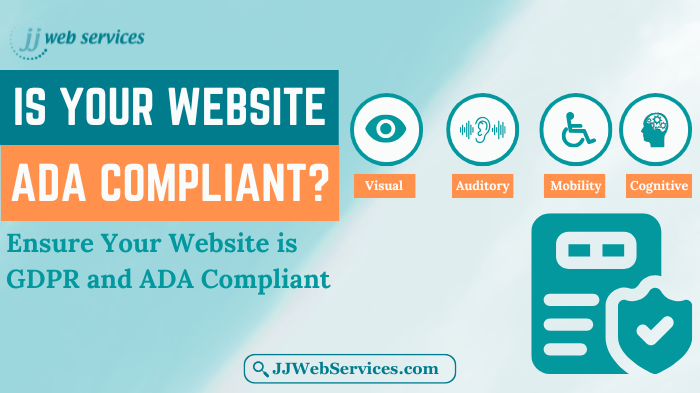Why Your Website Needs to Be Compliant: Key Rules and Regulations for U.S. Businesses

As a business owner, ensuring that your website is legally compliant is crucial—not only to avoid potential legal pitfalls but also to build trust with your customers. In the U.S., there are several important rules and regulations that websites must follow to ensure privacy, accessibility, and consumer protection. Here’s an overview of the key guidelines you need to be aware of, and how JJ Web Services can help you stay compliant.
1. Privacy and Data Protection (GDPR and CCPA)
Privacy laws are more important than ever. Websites that collect data must comply with various regulations, especially when interacting with customers from other regions.
-
General Data Protection Regulation (GDPR): If you collect data from residents of the European Union (EU), you must comply with the GDPR. While it’s an EU law, U.S. businesses that interact with EU customers are still required to meet its standards. Key principles include:
- Data consent: Obtaining user consent to collect and process their data.
- Transparency: Clearly stating how the data will be used.
- User rights: Giving users access to their data and the ability to request deletion.
-
California Consumer Privacy Act (CCPA): If your business interacts with California residents and meets certain criteria (like earning over $25 million in revenue), the CCPA applies. This law gives California residents the right to:
- Know what data is being collected.
- Request deletion of their personal information.
JJ Web Services can help you create and update your Privacy Policy to ensure compliance with GDPR, CCPA, and other privacy laws, making sure your users' data is properly protected.
2. Accessibility (ADA Compliance)
The Americans with Disabilities Act (ADA) is increasingly affecting websites, requiring businesses to ensure their websites are accessible to people with disabilities. Accessibility includes:
- Screen reader compatibility for visually impaired users.
- Keyboard navigation for those unable to use a mouse.
- Captions for videos and alternative text for images.
Your website must comply with the Web Content Accessibility Guidelines (WCAG) to provide an inclusive experience for all users.
JJ Web Services offers ADA compliance audits to evaluate your website and implement changes that make it more accessible. Let us help you avoid the risk of lawsuits and ensure your site is usable by everyone.
3. Consumer Protection and eCommerce Laws
For businesses selling products or services online, consumer protection laws are a must. Some key regulations to follow include:
- Federal Trade Commission (FTC) Regulations: Ensuring all advertising is truthful and not misleading.
- Terms and Conditions: Clearly outlining your business policies, return terms, shipping rules, etc.
- Payment Card Industry Data Security Standard (PCI DSS): If your website accepts credit card payments, it must meet security standards to protect cardholder data.
We can help you draft clear Terms and Conditions and implement secure payment processing to meet PCI DSS standards.
4. Copyright and Intellectual Property Laws
Ensuring that all content on your website is either owned by you or used with permission is crucial. Violating copyright laws can lead to hefty penalties.
- Fair Use and Licensing: Be careful when using third-party content (images, music, videos, etc.) on your site.
JJ Web Services can help you navigate these rules, ensuring your website content doesn’t infringe on intellectual property rights.
5. Cookie Consent (Especially for EU & California)
Websites that use cookies or tracking technologies need to obtain consent from users in certain regions (such as the EU and California).
- Cookie Banner: For users in these areas, you need to display a banner asking for consent to use cookies when they first visit your site.
We can help set up a cookie consent banner and ensure that your website complies with applicable laws.
6. Children’s Online Privacy Protection Act (COPPA)
If your website is directed to children under 13 years old or collects personal information from children, you must comply with COPPA. This law requires parental consent before collecting personal data from children.
7. Email Marketing and Spam Laws
If you engage in email marketing, make sure you comply with the CAN-SPAM Act. This law requires:
- Opt-out mechanisms for recipients.
- Accurate sender information.
- Non-deceptive subject lines.
JJ Web Services can ensure your email marketing campaigns are in full compliance with the CAN-SPAM Act.
8. State-Specific Rules
Different states may have their own rules regarding online business practices, including privacy laws (e.g., Virginia, New York) and sales tax regulations. If your business operates in multiple states, it’s important to be aware of each state’s laws.
How We Can Help You Stay Compliant
It can be overwhelming to navigate all the regulations surrounding website compliance. That’s where JJ Web Services comes in. We offer:
- Privacy Policy creation and updates.
- ADA compliance audits and website accessibility improvements.
- Terms and Conditions drafting.
- Secure payment processing.
- Cookie consent solutions.
We’ll make sure your website is fully compliant with the latest legal requirements, keeping you safe from potential legal issues.
What You Should Do Next
Take action today to protect your business and your customers by:
- Creating a Privacy Policy.
- Ensuring your website is ADA-compliant.
- Setting up cookie consent banners and secure payment processing.
Contact us today at 715-255-0499 or schedule a consultation. Let us help you ensure your website is fully compliant and ready for the future!


